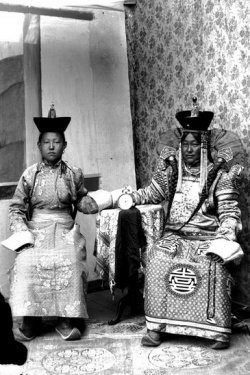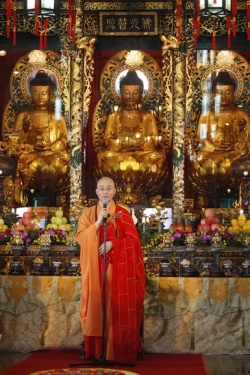Difference between revisions of "Abbot"
m (Text replacement - "application" to "application") |
|||
| Line 50: | Line 50: | ||
"There would be no [[difference]] in the names if we understood the same by both. [[Brahma]], the [[Absolute]], is generally interpreted to mean [[Being]] in general, but [[Amitâbha]] is [[Enlightenment]]. We do not hanker after [[existence]], but we {{Wiki|worship}} [[truth]], [[goodness]], and [[purity]]. | "There would be no [[difference]] in the names if we understood the same by both. [[Brahma]], the [[Absolute]], is generally interpreted to mean [[Being]] in general, but [[Amitâbha]] is [[Enlightenment]]. We do not hanker after [[existence]], but we {{Wiki|worship}} [[truth]], [[goodness]], and [[purity]]. | ||
| − | "By [[Amitâbha]] we understand the [[eternal]], [[infinite]] [[light]], i.e., the [[spiritual light]] of [[comprehension]], and this [[light]] is a [[reality]]. No one [[doubts]] that there is a norm of [[truth]] and a standard of right and wrong. That is [[Amitâbha]]. We may not yet know all about [[Amitâbha]]; our [[wisdom]] is limited; our [[goodness]] is not {{Wiki|perfect}}. But we ground ourselves upon that which we do know, while you [[Brahmans]] start with speculations, seeking a union with the [[Absolute]], which is a vague [[idea]], something unknown and unknowable. [[Amitâbha]] is certainly not a limited [[self-consciousness]], but an [[infinite]] [[principle]], an {{Wiki|omnipresent}} law, an [[eternal]] norm, higher than any {{Wiki|individual}}, but the depth of this norm is unfathomable, its | + | "By [[Amitâbha]] we understand the [[eternal]], [[infinite]] [[light]], i.e., the [[spiritual light]] of [[comprehension]], and this [[light]] is a [[reality]]. No one [[doubts]] that there is a norm of [[truth]] and a standard of right and wrong. That is [[Amitâbha]]. We may not yet know all about [[Amitâbha]]; our [[wisdom]] is limited; our [[goodness]] is not {{Wiki|perfect}}. But we ground ourselves upon that which we do know, while you [[Brahmans]] start with speculations, seeking a union with the [[Absolute]], which is a vague [[idea]], something unknown and unknowable. [[Amitâbha]] is certainly not a limited [[self-consciousness]], but an [[infinite]] [[principle]], an {{Wiki|omnipresent}} law, an [[eternal]] norm, higher than any {{Wiki|individual}}, but the depth of this norm is unfathomable, its application [[universal]] and [[infinite]]; its bountiful use [[immeasurable]]. |
"We know something but not all about [[Amitâbha]]. He is the [[Dharmakâya]], the [[embodiment]] of the good law. He is the [[Nirmanakâya]], the [[aspiration]] to reach [[bodhi]] in the transformations of the [[evolution]] of [[life]]. He is the [[Sambhogakâya]], the [[bliss]] of good deeds.22 The [[philosophers]], [[scientists]], poets, of the {{Wiki|future}}, the thinkers and dreamers of mankind, will find in [[Amitâbha]] a wonderful source of inspiration which can never be exhausted. The [[Tathâgata's]] [[religion]] is not mere [[metaphysics]], his [[philosophy]] is not mere [[mythology]]. He allows [[metaphysics]] and [[mythology]] their [[spheres]], but [[urges]] the {{Wiki|practical}} issues of [[life]]. Thus his [[religion]] comprises all without becoming vague." | "We know something but not all about [[Amitâbha]]. He is the [[Dharmakâya]], the [[embodiment]] of the good law. He is the [[Nirmanakâya]], the [[aspiration]] to reach [[bodhi]] in the transformations of the [[evolution]] of [[life]]. He is the [[Sambhogakâya]], the [[bliss]] of good deeds.22 The [[philosophers]], [[scientists]], poets, of the {{Wiki|future}}, the thinkers and dreamers of mankind, will find in [[Amitâbha]] a wonderful source of inspiration which can never be exhausted. The [[Tathâgata's]] [[religion]] is not mere [[metaphysics]], his [[philosophy]] is not mere [[mythology]]. He allows [[metaphysics]] and [[mythology]] their [[spheres]], but [[urges]] the {{Wiki|practical}} issues of [[life]]. Thus his [[religion]] comprises all without becoming vague." | ||
Revision as of 23:40, 26 October 2015
abbot (jūjishoku 住持職, jūji 住持, jūshoku 住職)
Literally, "responsible for" (shoku 職) "sustaining" (jūji 住持). Also called "head of the establishment" (dōchō 堂頭). The most senior officer in a monastery bureaucracy, the abbot is considered the spiritual leader of all the monks in residence and chief representative of the community to the outside world. At Soto Zen monasteries and temples, the abbot must be a dharma heir in the Soto lineage. Traditionally, the abbot's main duties are:
(1) providing group and individual instruction, as in major convocations (jōdō 上堂), small convocations (shōsan 小參), and when disciples "enter the abbot's room" (nisshitsu 入室);
(2) acting as officiant (dōshi 導師) for daily, monthly, and annual services in which offerings are made to beings enshrined on altars;
(3) serving as liaison to other monasteries, the denominational headquarters, and the broader Buddhist sangha; and
(4) dealing with the laity, including parishioners and donors who support the monastery and the civil authorities who have legal jurisdiction over it. In the past, the abbots of major Zen monasteries in Japan often served for a fixed period of time, such as three years. At present, however, the abbots of most ordinary temples and many training monasteries hold their positions for life. At ordinary Zen temples, the abbot is often the only ordained member of the Buddhist sangha in residence and thus is often called a "resident priest" in English translations of jūshoku. Most resident priests marry and raise a family, ordain their sons when the latter reach adolescence, and are eventually succeeded by one of them.
abbot
1. The superior of a monastery.
2. Abbr. Abb. Used as a title for such a person.
One Chinese term for abbot, fangzhang 'ten feet square' is a term used primarily in Chan monasteries and refers to the ideal size of the abbot's quarters. The great enlightened Buddhist layman Vimalakirti, who lived during the time of the Buddha, was said to have lived in a stone room of that size.
Another frequently used Chinese term for abbot is zhuchi, literally "dweller and upholder", is explained as meaning that the abbot is one who protects the Dharma while abiding peacefully in the world.
The abbot was Taoism natural appellation, Buddhism China After borrowing this commonly known as. The temple Abbot house called the abbot, also called hall, main hall. This is an abbot word sense. Generalized Abbot Abbot except refers to dwellings, including its affiliated facilities such as dormitory, Tang, Liao, tea.
While King Kanishka stayed at the summer palace to witness the tiger hunt, a Buddhist abbot came to the royal palace and requested an interview with the great King Kanishka's friend; and the abbot was admitted into the presence of Charaka, who happened to be in the company of some councilors of King Subâhu, among whom was Açvaghosha, the saintly philosopher. Said the abbot: "I come from the monastery in the hills situated near a Brahman village south of Benares and have been sent by the brethren, the venerable monks whose abbot I am. We know that King Kanishka and you are followers of the Buddha and are steadfast in the orthodox faith. Therefore we approach you in confidence and hope that you will lend your countenance to us, endeavoring to spread and establish the good law, the pure religion of the Tathâgata. We have settled in the hills, but there is a Shiva shrine close by and the villagers continue to offer gifts to the priests while the venerable brethren who profess faith in the glorious doctrine of the Buddha are neglected and sometimes positively suffer from privation."
"What can I do about it?" queried Charaka.
"If the Shiva shrine were removed, the villagers would no longer seek religious comfort through Brahman rites and would turn Buddhists. We are told that you are a Buddhist monk; you will have sympathy with your suffering brethren and help them to expel the unbelievers."
"And do you think," objected Açvaghosha, "that either King Subâhu or King Kanishka would lend you his royal authority to interfere with the religious service of any one? No, my friend. The Shiva worshipers may be mistaken in their religious views, but they seek the truth and so long as they do no injury to their neighbors, their worship cannot be disturbed. And I do not know but the Shiva
priests may in their own way do good service to the people."
And there was a Brahman present, one of King Subâhu's councilors, who was pleased with Açvaghosha's remark and expressed his approval of the principle of toleration which the great emperor Açoka had proclaimed in one of his edicts as a maxim of good government, and the Brahman added:
"Do not ye, too, O Buddhists, preach the doctrine of the Brahmans, that there is a supreme Lord Creator over all creatures, a divine ego-consciousness of All-existence? Whether we call God Ishvara, or Shiva, or Amitâbha, he remains the same and has a just claim to worship."
Açvaghosha shook his head: "No, my Brahman friend! The good law is supreme, and it is a father omnibenevolent as we rightly designate it. It is the norm of existence, the standard of truth, the measure of righteousness; but that norm is not an Ishvara, neither Shiva, nor Brahma. Here is the difference between Ishvara and Amitâbha: Ishvara is deified egotism; he demands worship and praise. Amitâbha is love, he is free from the vanity of egoism and is only anxious for his children that they should avail themselves of the light and shun the darkness, that they should follow his advice and walk in the path of righteousness. Ishvara calls sin what is contrary to his will; he loves to be addressed in prayer and he delights in listening to the praises of his worshipers. Not so Amitâbha. Amitâbha cares not for prayer, is indifferent to worship, and cannot be flattered by praise, but the good law is thwarted when his children err; and Amitâbha appears to be wrapt in sadness by the evil results of their mistakes; not for his sake—for he is eternal and remains the same forevermore—but for the sake of the sufferings of all sentient creatures, for all creatures are his disciples, he guides them, he teaches them, he encompasses them. He is like a father unto them. So far as they partake of his nature, they are his children."
Said the Brahman: "I for one do not believe that Ishvara, or Brahma, or whatever you may call God, is a person such as we are. He is a higher kind of personality, which however includes the faculties of perception, judgment and reason. I believe therefore that the Buddhist faith is lacking in this, that its devotees think of Amitâbha as deficient in self-consciousness. Buddhist ethics are noble, but are human deeds the highest imaginable? Since the godhead is greater than man, the highest bliss will forever remain a union with Brahma, or Ishvara, or Sakra, or whatever you may call the great Unknown and Unknowable, who has revealed himself in the Vedas and is pleased with the prayers and sacrifices of the pious who express their faith in worship."
"When I was young," replied Açvaghosha, "I was a Brahman myself; I believed in Brahma the Supreme Being, the Creator of and Lord over all the worlds that exist. I know there is much that is good in the Brahman faith, and I did not abandon it because I deemed it bad or injurious. I abandoned it, because the doctrine of the Tathâgata was superior, all-comprehensive; and more profound, for it explains the problems of existence, its whence and whither, and is more helpful. The doctrine of the Tathâgata is practical and not in the air as are the theories and speculations of the Brahmans. You seek a union with Brahma, and what is he? We may dispute his existence and no one can refute us. He is an idea, a metaphysical assumption, and his mansion is everywhere and nowhere. Thus the Tathâgata says that those who believe in Brahma are like a man who should make a staircase where four roads meet, to mount up high into a mansion which he can neither see nor know how it is, where it is, what it is built of, nor whether it exists at all. The priests claim the authority of the Vedas, and the Vedas are based upon the authority of the authors who wrote them, and these authors rely on the authority of Brahma. They are like a string of blind men clinging to one another and leading the blind,21 and their method of salvation consists in adoration, worship, and prayer." It is a doctrine for children, and though the words of their theory are high-sounding they are not the truth but a mere shadow of the truth; and in this sense the Tathâgata compared them to the monkey at the lake who trie
to catch the moon in the water, mistaking the reflection for the reality."
"But would not all your arguments," replied the Brahman, "if I were to grant them, apply with the same force to Amitâbha? What is the difference whether we say Brahma or Amitâbha? Both are names for the Absolute."
"There would be no difference in the names if we understood the same by both. Brahma, the Absolute, is generally interpreted to mean Being in general, but Amitâbha is Enlightenment. We do not hanker after existence, but we worship truth, goodness, and purity.
"By Amitâbha we understand the eternal, infinite light, i.e., the spiritual light of comprehension, and this light is a reality. No one doubts that there is a norm of truth and a standard of right and wrong. That is Amitâbha. We may not yet know all about Amitâbha; our wisdom is limited; our goodness is not perfect. But we ground ourselves upon that which we do know, while you Brahmans start with speculations, seeking a union with the Absolute, which is a vague idea, something unknown and unknowable. Amitâbha is certainly not a limited self-consciousness, but an infinite principle, an omnipresent law, an eternal norm, higher than any individual, but the depth of this norm is unfathomable, its application universal and infinite; its bountiful use immeasurable.
"We know something but not all about Amitâbha. He is the Dharmakâya, the embodiment of the good law. He is the Nirmanakâya, the aspiration to reach bodhi in the transformations of the evolution of life. He is the Sambhogakâya, the bliss of good deeds.22 The philosophers, scientists, poets, of the future, the thinkers and dreamers of mankind, will find in Amitâbha a wonderful source of inspiration which can never be exhausted. The Tathâgata's religion is not mere metaphysics, his philosophy is not mere mythology. He allows metaphysics and mythology their spheres, but urges the practical issues of life. Thus his religion comprises all without becoming vague."
Said the Brahman: "How can so many contradictory things be united in one?"
And Açvaghosha replied: "My venerable
teacher, the saintly sage Parsva, once told me the parable of the elephant which explains the relation of the truth to the sundry doctrines held by the several sects and schools, priests and philosophers, prophets and preachers.
The Brahman said that he had never heard the story, and expressed his desire to hear it.



